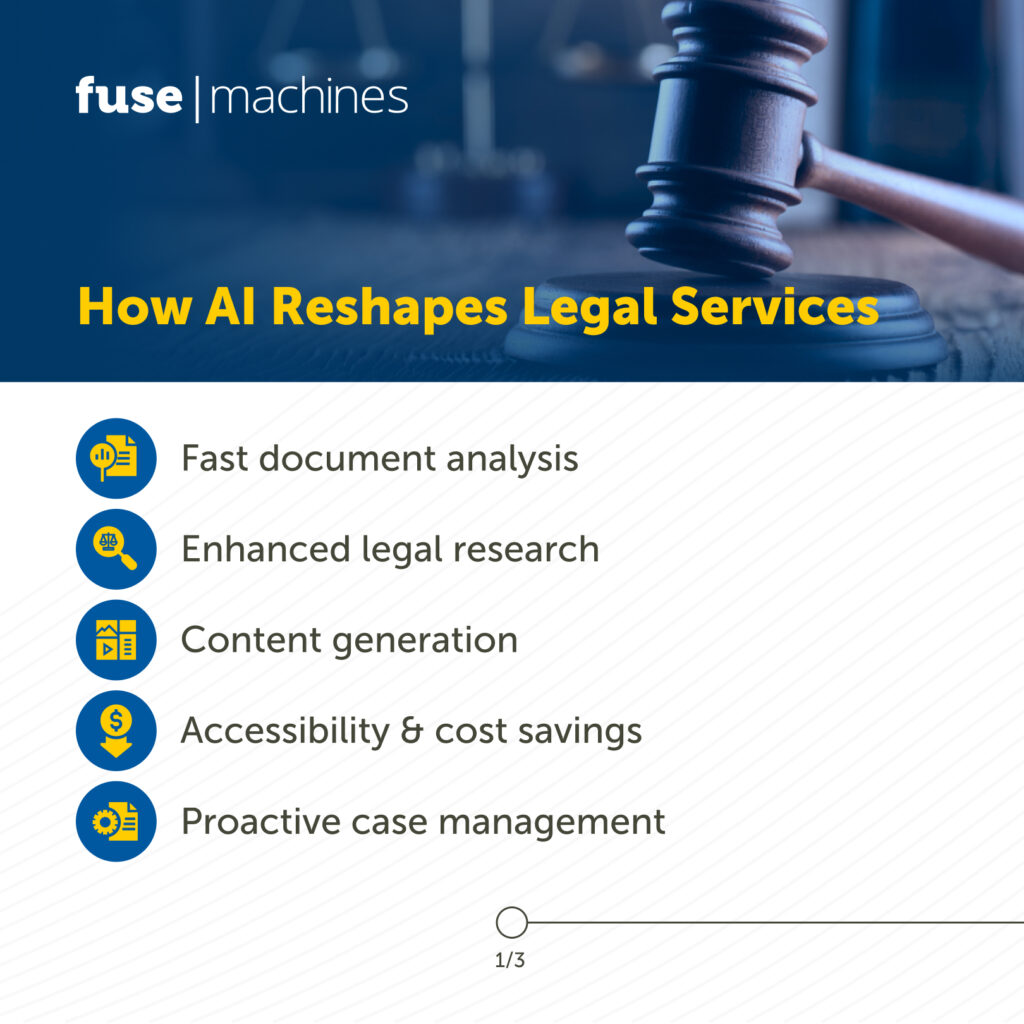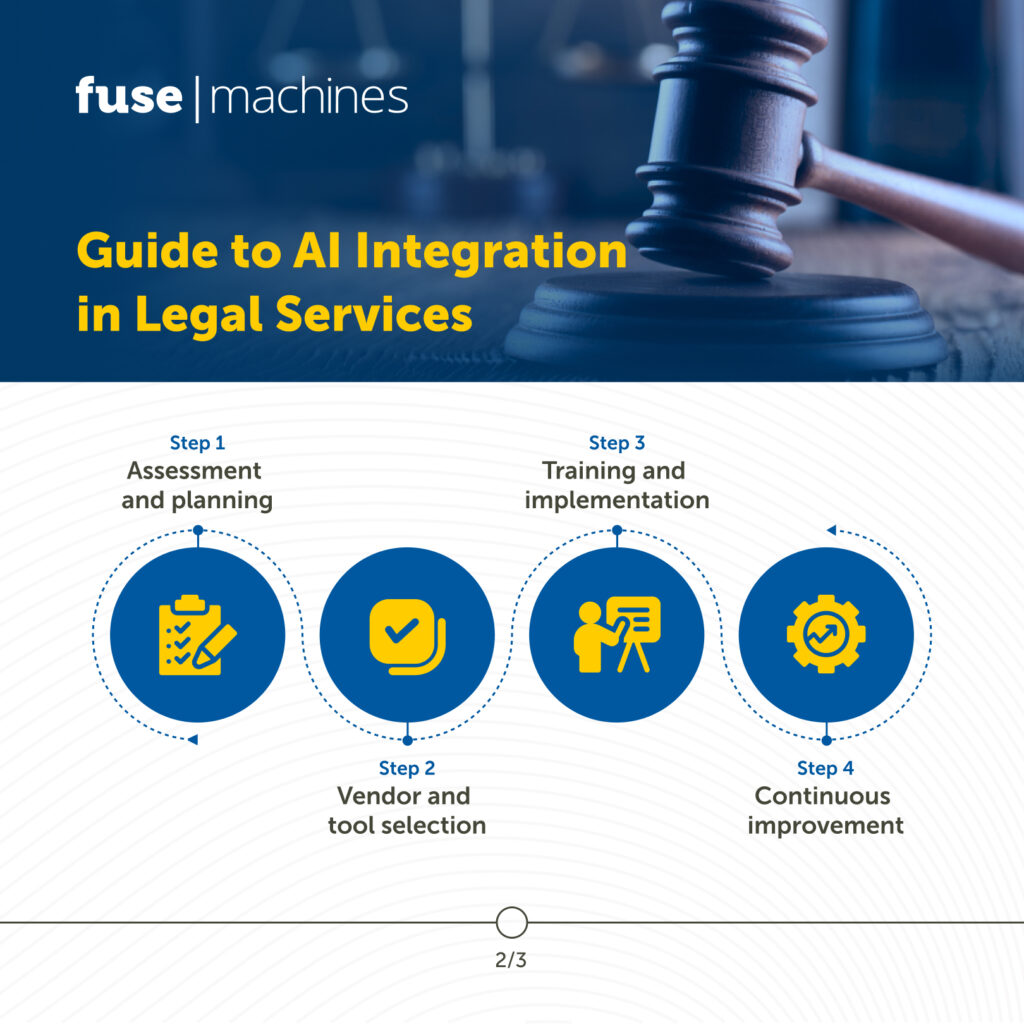The Role of AI in Legal Services

AI is changing the way industries across the board function. As technology is developed and refined, more companies are transitioning to AI systems that have the capacity to enhance efficiency. The demand for these systems is growing exponentially, with 91% of businesses reporting an ongoing investment in AI. In the legal field, the impact of AI is pivotal in transforming the provision of legal services.
It’s clear that companies will have to invest in AI transformation to maintain market relevancy and stay competitive. With the ability to review thousands of documents within seconds, extract relevant information, and assist in drafting contracts and legal documents, AI has the potential to enhance long-standing practices in the legal field. The profound impact of AI implementation will reshape the way legal services have been conducted for decades.
Understanding the Need for AI in Legal Services
According to a study from Goldman Sachs, AI can perform 44% of legal tasks, more than any other industry except for clerical and administrative work. Building a case requires sifting through thousands of documents worth of evidence, reports, and historical cases. This process requires days of research conducted by teams of lawyers, a service that is costly to the client and tedious for lawyers and paralegals.
Benefits of AI in Legal Services

Using AI to assist with legal tasks is becoming the fastest and most cost-effective way for lawyers to efficiently provide legal services. What would take humans days worth of due diligence and document analysis, AI can accomplish in a matter of seconds.
Automating Research and Due Diligence
One application of AI in the legal field is reviewing and analyzing large quantities of legal documents, and extracting pertinent information to help build a case. It can understand laws past and present to help with legal research. By reviewing historical cases and searching for ones similar to the case at hand, AI can determine which legal strategies worked and which didn’t in order to develop the best legal strategy.
Content Generation
AI can generate content as well. AI can help draft secure contracts that foresee and prevent potential loopholes, as well as help draft statements and arguments and conduct litigation preparation.
The Impact of AI Implementation into Legal Services
The impact of AI implementation into legal services will have astronomical effects on industry norms. A study conducted by Princeton University determined that law is the field most likely to incur the biggest change from AI. AI can analyze large quantities of legal documents and extract pertinent information in a fraction of the time it would take humans. It can identify and interpret law with human-like understanding. These features eliminate the need for teams of lawyers reading through thousands of documents. With this, smaller firms will have the ability to take on larger cases.
Since teams of lawyers are expensive, the implementation of AI will make legal services cheaper and more widely available, giving people access to legal help that may not have been previously affordable. The AI capacities give recent law school graduates and independent lawyers the opportunity to start their own solo practices.
Fusemachines has experience deploying AI platforms and can help leverage them to develop custom solutions for enterprises across industries. Click here to schedule a free conversation with our experts today.
How AI Technology Works in Legal Studies
Experts have developed law-specific AI systems to help lawyers review legal documents and draft cases. Programs allow users to upload case materials, and in return the system drafts a statement. Algorithms have previously aided lawyers in the process of discovery. However, the advancements in AI technology have gone even further with the integration of Machine Learning techniques. Machine Learning algorithms are now utilized to locate, classify, and analyze documents, going beyond simple identification to extract pertinent information. By leveraging vast amounts of data, these algorithms can discern patterns, relationships, and key details that aid in building stronger legal arguments.

Challenges to AI Utilization in Legal Services
Although the future of AI in legal services promises pivotal levels of efficiency and accuracy, there are a few challenges that cannot be ignored.
Privacy
A concern of lawyers and clients alike is the issue of data-privacy and attorney-client privilege. If not done intentionally, plugging sensitive information into insecure AI platforms could put client privacy in danger. Luckily, the cybersecurity field is constantly innovating, and systems have already been developed that solve this issue.
Legitimacy of Legal Evidence
Another concern is the legitimacy of legal evidence provided by AI systems. While AI has been known to fabricate cases, the development of legal AI solutions addresses the concern.
Bottom Line
The integration of AI in the legal field holds immense potential for enhancing legal services. The ability of AI systems to automate routine tasks, analyze vast amounts of legal documents, and generate accurate legal content has the power to greatly enhance efficiency and accessibility. This will result in cost savings, increased availability of legal services, and the empowerment of smaller firms and independent lawyers. It is essential to recognize that while AI offers significant benefits, human oversight and expertise remain crucial. By combining AI with human skill, the legal industry can harness the full potential of this technology while maintaining the integrity and trust that is fundamental to the practice of law.
Click here to learn more about AI strategies and solutions from Fusemachines.


